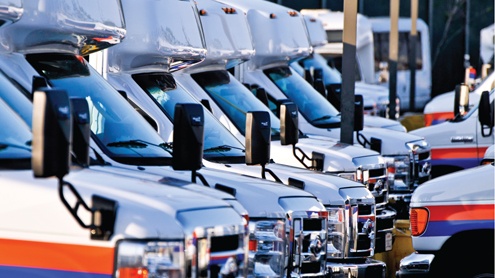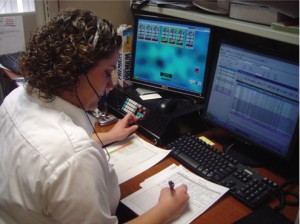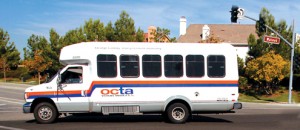
Innovative paratransit model by Veolia Transportation promotes quality of service and cost efficiency
By Ron Brooks

With the passage of the American Disabilities Act (ADA) most aspects of our society have become much more accessible to people with disabilities. Greater numbers of people with disabilities are relying on public transit for travel to work, school, and their personal and professional business. Meanwhile, more baby boomers are trading their cars for seats on paratransit.
The predictable result is that paratransit demand is on the rise. This rising demand, coupled with the ever-increasing employee, fuel, insurance and capital costs associated with the delivery of these services, are making the funding of paratransit one of the industry’s most vexing challenges, and ultimately, I believe that without a fundamental alteration in the way we deliver service, the current paratransit model is economically and operationally unsustainable.
There is an old paratransit axiom that says you can’t have both cost-effective and high-quality service. Focus on cost, and you sacrifice quality. Focus on quality, and the price goes up.
In the past, the transit industry had few answers for the “quality vs. cost” dilemma, but new paratransit business models are debunking the “cost vs. quality” myth. Veolia has developed a new model called IntelliRide as a new approach to simultaneously improve service quality and cost.

Introducing IntelliRide™
IntelliRide is a business approach for operating paratransit that encompasses both operational practices and technology to deliver paratransit that is safe, reliable and cost effective. The key elements of the IntelliRide model include:
The use of both dedicated vehicles (such as traditional paratransit vans) and non-dedicated vehicles (such as taxicabs) in order to promote efficiency and flexibility.Dedicated vehicles are great when there is a sufficient number of paratransit trips to keep the vans busy and when trip patterns and density will allow for trip-sharing. However, dedicated vehicles are not cost-effective to operate at times when demand and productivity are low.
In addition, there are typically a few hours during each weekday morning and afternoon when demand spikes. Although these trips can often be routed efficiently, the investment in and use of a dedicated vehicle or vehicles to cover these spikes is costly.
The goal of IntelliRide is to use dedicated vehicles for service that is predictable and productive and non-dedicated vehicles for trips that occur when system productivity and demand are low — or to cover peak-hour demand spikes. Non-dedicated vehicles are also very effective for recovering service when a route is running late or for trips which have not been pre-scheduled, such as return trips from medical appointments which are difficult to schedule in advance. Ultimately, IntelliRide not only increases system efficiency and flexibility; it also allows for the operation of more service with fewer dedicated vehicles and a smaller capital investment. The trick is finding the right mix —something that is unique for each system.
Proprietary middleware developed by Veolia’s Unified Dispatch, LLC (UDI) seamlessly transmits trip data between a paratransit software system and a taxi dispatch software system and/or GPS-enabled tablet computers used by drivers of non-dedicated vehicles. IntelliRide’s middleware offers a number of key operational advantages. They include: the ability to seamlessly transmit trip data in real-time, the ability for dispatchers, the transit agency and even riders to monitor service and the status of individual trips in real-time (regardless of who provides the trip), and the ability to maintain the same data for all trips in a consistent format.
 Consistent driver screening and training requirements that result in consistent service quality across all modes and which assures full compliance with all federal, state and local regulatory requirements.
Consistent driver screening and training requirements that result in consistent service quality across all modes and which assures full compliance with all federal, state and local regulatory requirements.
Ability to integrate with an agency’s existing software, technology and operational approach – Because every transit agency is different, IntelliRide can be customized based on the size and configuration of the agency’s fleet, on the agency’s technology environment, and even on whether or not the agency wishes to operate a portion of its services internally. In short, we designed IntelliRide not only as a comprehensive stand-alone approach for delivering paratransit, but also as a set of tools and technologies which can be grafted onto the agency’s existing paratransit infrastructure, thereby preserving prior financial, technology and personnel investments.
IntelliRide improves quality and saves money
In 2006 — long before we came up with its name — IntelliRide helped us to simultaneously improve service quality and productivity for one of the largest paratransit systems in the country. In Orange County, CA, Veolia and our subcontractor, American Logistics Corporation (ALC), worked with our client, the Orange County Transit Authority to implement a service model that allows Veolia to operate the bulk of service (approximately 4,200 trips per average weekday) with a client-provided fleet of 248 vehicles. We also subcontract the delivery of approximately 400 trips per day to ALC.
Veolia operates a state-of-the-art call center provided by OCTA, where we accept all trip requests and schedule all trips within the OCTA-provided Trapeze system. We begin by assigning those trips that can be productively scheduled to the dedicated vehicle fleet. Then we assign all other trips (which include late-night trips, approximately half of all weekend trips and any other trips that cannot be accommodated on the dedicated vehicle fleet) to ALC.
Since 2006 (the year Veolia and ALC began service), productivity has improved from about 1.8 to more than 2.2 trips per hour. On-time performance has gone from under 90 percent to around 94 percent. Finally, in a 2011 survey conducted by OCTA, customer satisfaction improved in all areas measured by the survey.
Much has changed from those early days in 2006. Today Veolia’s IntelliRide business approach is able to use UDI’s middleware in conjunction with a taxi provider’s dispatch system or GPS-enabled tablet computers to create a continuous data link between any agency’s paratransit scheduling software environment and any dedicated or non-dedicated vehicle providing service. This means real-time access to the status of each and every trip and real-time access to all performance data — regardless of whether the trip is provided on a van or in a taxi.
In addition to these advances in technology, Veolia has used its growing presence and experience in both the paratransit and retail ground transportation arenas to create IntelliRide business practices that result in better training for drivers and service that is safe, and reliable for riders and transparent for agencies.
IntelliRide is one of many examples of how the industry is responding to the challenge of delivering safe, reliable and cost-effective paratransit service. Other efforts include the development of smaller accessible vehicles and the increasing use of a wide range of technologies designed to improve rider convenience, reduce dwell times, increase productivity and better manage and track passenger fares and other program data.
Ultimately, we believe all of these efforts will transform the paratransit systems of today into systems that offer safety, reliability and flexibility for riders even as they offer transparency and cost-effectiveness for the agencies that pay the bills. In short, the day will come when paratransit passengers no longer have to choose between product and price because they will be able to have both. BR
Ron Brooks serves as vice president, Paratransit and IntelliRide Development for Veolia Transportation, Phoenix, AZ.
